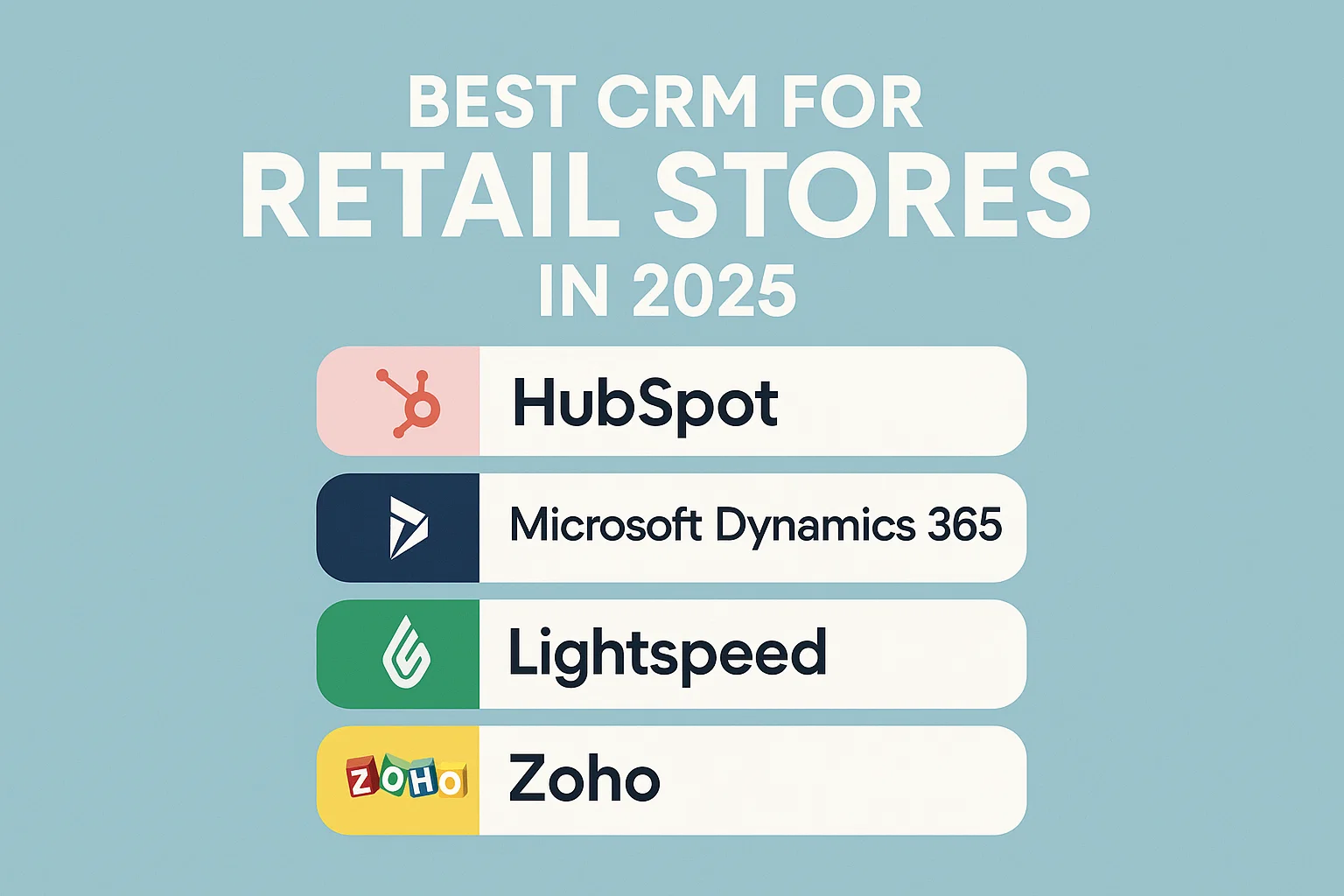Best CRM for Retail Stores in 2025

Best CRM for Retail Stores in 2025
Retail businesses in 2025 face ever-increasing competition and changing customer expectations. From personalized marketing to inventory management, a robust CRM (Customer Relationship Management) system can streamline store operations, improve customer relationships, and increase sales revenue.
Why Retail Stores Need a CRM
CRMs are no longer just sales tools; they are essential platforms for managing all aspects of a retail business. Key reasons retail stores need a CRM include:
- Centralized customer data for personalized marketing campaigns.
- Tracking purchase history to understand buying patterns.
- Managing loyalty programs and customer engagement.
- Automating communications and promotions across multiple channels.
- Integrating with point-of-sale (POS) and inventory management systems.
Key Features of a Retail CRM
- Customer Profile Management: Store detailed customer information, preferences, and purchase history.
- Loyalty & Rewards Program: Automate reward points, offers, and personalized promotions.
- Marketing Automation: Email campaigns, SMS notifications, push notifications, and segmentation.
- Sales Tracking & Analytics: Monitor store performance, sales trends, and customer insights.
- Inventory Integration: Sync CRM with POS and inventory systems to manage stock efficiently.
- Omnichannel Engagement: Engage customers through email, social media, and in-store experiences seamlessly.
| CRM | Best For | Key Features | Pricing |
|---|---|---|---|
| Salesforce Retail CRM | Large retail chains | Customer profiles, omnichannel engagement, marketing automation, inventory integration | From $25/user/month |
| Zoho CRM | Small to medium retail stores | Customer management, loyalty programs, email marketing, analytics dashboards | Free plan available, paid from $12/user/month |
| HubSpot CRM | Retail startups & boutiques | Contact management, marketing automation, pipeline tracking, analytics | Free plan available, paid plans from $50/month |
| Pipedrive | Sales-focused retail teams | Sales pipelines, task automation, mobile access, reporting dashboards | From $14/user/month |
| Freshsales | AI-driven retail insights | AI-based recommendations, customer segmentation, workflow automation | From $15/user/month |
Benefits of Using a CRM in Retail
- Improved customer loyalty through personalized experiences.
- Increased sales via targeted promotions and campaigns.
- Streamlined operations and inventory management.
- Better decision-making with real-time analytics and insights.
- Enhanced communication across all channels and stores.
Best Practices for Retail CRM Implementation
- Define clear sales and marketing workflows before CRM adoption.
- Segment customers for personalized offers and promotions.
- Integrate CRM with POS, inventory, and eCommerce systems.
- Automate loyalty programs and targeted email campaigns.
- Train store staff and managers for seamless CRM usage.
- Continuously analyze CRM data to optimize campaigns and operations.
Future Trends for Retail CRMs in 2025
- AI & Predictive Analytics: Anticipate customer behavior and optimize stock levels.
- Omnichannel Engagement: Integrate in-store, online, and mobile experiences.
- Voice & Chatbot Integration: Provide instant support and personalized assistance.
- Mobile-First CRM: Enable retail teams to access customer and sales data on-the-go.
- Advanced Loyalty & Reward Programs: Incentivize repeat purchases with automated reward systems.
Conclusion
For retail businesses in 2025, a CRM is not optional—it's a strategic asset. From increasing customer loyalty to streamlining store operations and boosting sales, the right CRM enables retail stores to remain competitive and responsive to ever-changing consumer demands.
FAQs
1. Is a CRM suitable for small retail stores?
Yes. Many CRMs like Zoho, HubSpot, and Pipedrive offer affordable plans and scalable features suitable for small stores.
2. Can a CRM integrate with POS and inventory systems?
Absolutely. Most modern CRMs provide integrations with POS, inventory, and eCommerce platforms for seamless operations.
3. How does a CRM improve customer loyalty?
By maintaining detailed customer profiles, sending personalized promotions, and managing loyalty programs effectively.
4. Can retail staff access CRM data on mobile?
Yes, mobile-accessible CRMs allow store managers and sales staff to access customer and sales data anywhere, anytime.
5. Which CRM is best for retail chains?
Salesforce CRM is ideal for large retail chains due to its extensive features, scalability, and integrations.
Comments (3)